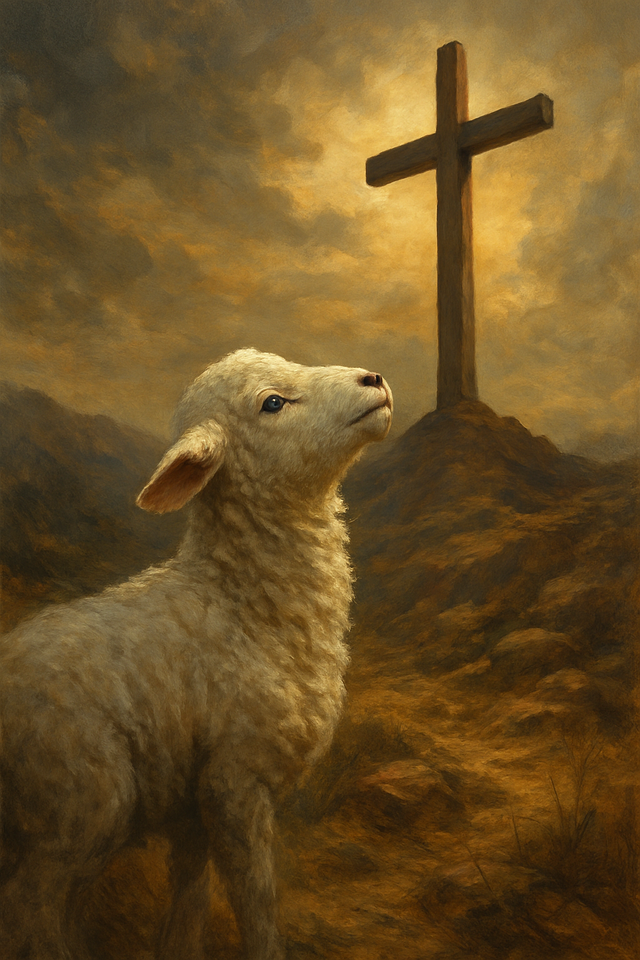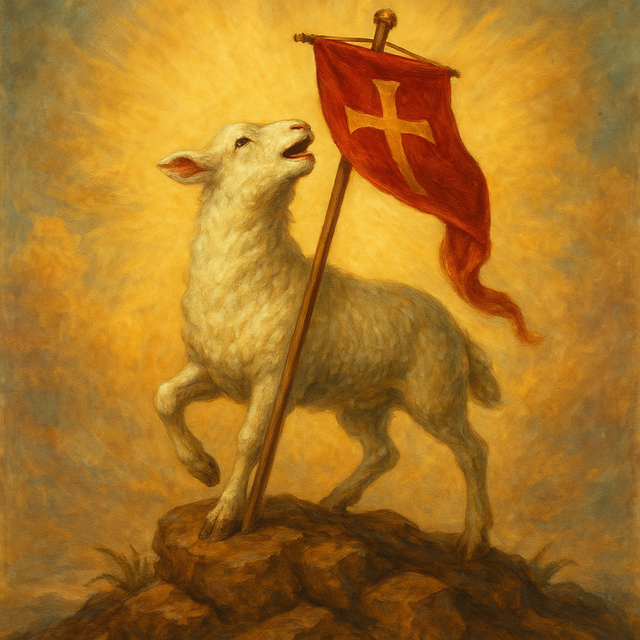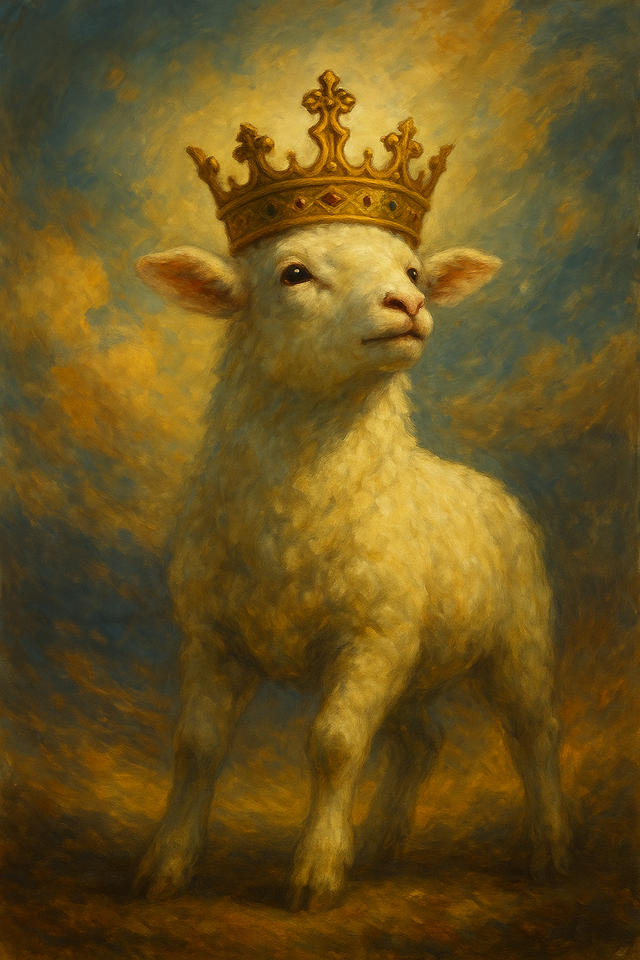Can you Behold the Lamb … Will You? John 1:29
Text: John 1:29
“The next day John seeth Jesus coming unto him, and saith, Behold the Lamb of God, which taketh away the sin of the world.”[1]
A Voice, a Vision, and a Victorious Lamb
Brethren, the heavens had been as brass for four hundred years.[2] No prophet’s voice had broken through the gloom. No divine oracle had stirred the soul of Israel. The lamp flickered in the holy place,[3] but gave no clear light to the nation’s path—until, in the wilderness, there arose a voice.
Behold the lamb….
That voice belonged not to a nobleman, nor to a priest robed in luxury, but to a man clothed in camel’s hair, eating locusts and wild honey[4]—John the Baptist. Sent of God. Filled with the Holy Ghost from his mother’s womb.[5]
His was a voice of thunder before the rain.
His ministry was brief, but it shook the kingdom. On this day, he sees Jesus—yea, Jesus!—and cries,
“Behold the Lamb of God, which taketh away the sin of the world!”[1]
What dear brethren was he saying to them and to us today?
He said, “I am the voice of one crying in the wilderness.”[6] A voice—not the Word.[7] A witness—not the Judge.[8] A forerunner—not the Bridegroom.[9] An Harbinger - not the Messiah.
John the Baptist stood not only as a forerunner with feet dusted by the desert’s path, but as a harbinger whose very voice was a thunderclap of divine warning and divine welcome. A forerunner prepares the road,[10] but a harbinger declares the hour! In John, both callings kissed—he hewed the path with repentance and cried aloud the advent of the Lamb. His garments were rough,[4] his words were sharp,[11] but his mission was golden; for he came not to build an altar, but to point to the Sacrifice.
O beloved, take heed—this is the posture of every true preacher of righteousness. We are not the message.[12] We are the messengers. We are not the light. We bear witness of the light.[13] John was content to be forgotten so long as Christ was magnified. “He must increase, but I must decrease.”[14]
Oh, what a tragedy that in our age men make much of themselves and little of Christ! We are not merely living in Generation X or Alpha or Beta—we are drowning in the Selfie Generation—a people intoxicated with their own image, addicted to the altar of their own admiration. They behold not the Lamb, but their own reflection!
No memory of the past, no fear of God, no care for eternity—just a momentary snapshot of pride, filtered and framed. Oh, the madness of a generation that stares into its own face and never sees its own soul!
But John cried not, “Behold yourselves,” but “Behold the Lamb of God!”[1] And until this world turns from gazing at man to gazing upon Christ, there shall be no hope, no healing, and no heaven.
And what shall we say of this modern clergy, these selfie shepherds, whose sermons are more memoir than message—more story than Scripture? They stand not as heralds of holiness but as influencers of irreverence, more eager to share their journey than to declare Jesus. John would have none of it. He cried not, “Behold my ministry, my movement, my following,” but “Behold the Lamb of God!”
Ah, but how shall they preach the Lamb when they cannot even define a man?[15] How shall they proclaim the Christ when they do not know the Creator?[16] Their gods are fashioned by algorithms, their theology fed through artificial minds, and lo—they emerge with a deity made in their own image: soft on sin, fluid in truth, absent of wrath, and blind to Calvary.[17]
We must return—return to the wilderness, where one man with heaven’s burden and burning lungs still cries, “Behold the Lamb of God.”
What kind of eyes does it take to truly behold the Lamb? While others saw only a carpenter’s son from Nazareth,[18] John saw the Lamb of God.
Now, consider the weight of this phrase. It is not mere poetry. It is pregnant with prophecy and drenched in divine blood. It hearkens to Abraham and Isaac on Mount Moriah—“God will provide himself a lamb.”[19] It reaches back to the Passover in Egypt,[20] when the blood of a spotless lamb stayed the death angel’s hand. It echoes through the temple sacrifices[21] and trembles in the voice of Isaiah,[22] who declared, “He is brought as a lamb to the slaughter.”
But lo! Now the shadows flee. The types are fulfilled. For God hath provided Himself a Lamb—not from the flock, not from among men, but from the bosom of the Father.[23]
Jesus is that Lamb—spotless,[24] sinless,[25] suitable,[26] and sufficient.[27] The Father sent the Son,[28] the Son offered Himself through the eternal Spirit,[29] and the Lamb of God, slain from the foundation of the world,[30] fulfills every shadow, satisfies every demand, and secures eternal redemption for all who behold Him in faith.
Let me address the accusation—or assertion if you will—that Jesus was merely one way, and that sin could have been paid for by some other means, through some other man, or some other method.
I will address this through proclamation—and without apology.
If not Jesus, then who?
Shall it be Mohammed, who took wives by force and sanctioned the sword but bore no cross and shed no blood for sin?
Shall it be Buddha, who taught detachment from suffering but offered no substitute for the guilty soul?
Shall it be Confucius, who imparted wisdom but never claimed to bear the sins of the world?
Shall it be Joseph Smith, who brought confusion and contradiction, and died for his own cause, not yours?
Shall it be Charles Taze Russell, who denied the cross's power and rewrote Scripture to suit his theology?
Shall it be the Pope, who wears a robe of tradition but has no righteousness to clothe your naked soul?
Shall it be yourself—the ever-failing, ever-falling sinner, who cannot even cleanse your thoughts for a day, let alone your heart for eternity?
No! A thousand times no!
None of these can bear your sin. None of these can stand in your stead. None of these ever claimed to take away the sin of the world—nor could they if they tried.
All are sinners. All are dead. All are dust. There is only One who is spotless,[24] sinless,[25] suitable,[26] and sufficient.[27]
Only Jesus.
All else is vanity and broken cisterns.[53] Rituals may touch the flesh, but they leave the soul unwashed. Works may polish the surface, but the heart remains unclean.[54]
Why would you trust a Jesus who cannot take away sin?
Why settle for a form of godliness that denies the power thereof?[55]
Some perfumes are not sold by the ounce because they are not worth the bottle that holds them. Some religions sell cheap grace because their gods are powerless to save. But we preach Christ crucified—the power of God and the wisdom of God.[56] He is the Lamb. The only Lamb.
Conclusion
John said, “I saw, and bare record that this is the Son of God.”[57]
Friend, have you seen Him?
He taketh away the sin of the world. That means yours.
Come. Behold the Lamb.
Footnotes:
[1] John 1:29, KJV.
[2] Amos 8:11; cf. Malachi 4:5–6.
[3] 1 Samuel 3:3.
[4] Matthew 3:4; Mark 1:6.
[5] Luke 1:15.
[6] John 1:23; Isaiah 40:3.
[7] John 1:1, 14.
[8] John 5:22; Revelation 20:12.
[9] John 3:29.
[10] Matthew 3:1–2.
[11] Matthew 3:7–10.
[12] Romans 10:15.
[13] John 1:7–8.
[14] John 3:30.
[15] Genesis 1:27; Matthew 19:4.
[16] John 1:10–11; Romans 1:21–25.
[17] 2 Timothy 4:3–4.
[18] John 6:42.
[19] Genesis 22:8.
[20] Exodus 12:3–13.
[21] Exodus 29:38–39; Numbers 28:3–4.
[22] Isaiah 53:7.
[23] John 1:18.
[24] 1 Peter 1:19.
[25] Hebrews 4:15.
[26] Hebrews 7:26.
[27] Hebrews 10:14.
[28] 1 John 4:14.
[29] Hebrews 9:14.
[30] Revelation 13:8.
[31] Romans 3:29.
[32] Micah 7:19; Psalm 103:12.
[33] John 3:14–16.
[34] John 10:16.
[35] Revelation 22:17.
[36] Romans 5:6–8.
[37] 2 Samuel 12:13; Psalm 51.
[38] Luke 8:2.
[39] Luke 22:61–62; John 21:15–17.
[40] Isaiah 63:1; Zephaniah 3:17.
[41] 1 Peter 2:24.
[42] 2 Corinthians 5:21.
[43] Matthew 3:16–17.
[44] 1 Samuel 16:13.
[45] Leviticus 8:12.
[46] Isaiah 61:1–2; Hebrews 5:1–10.
[47] Hebrews 9:12; Hebrews 10:10.
[48] Mark 2:7; Hebrews 4:14–16.
[49] Titus 3:5.
[50] Acts 4:12.
[51] Colossians 2:8.
[52] Ephesians 2:8–9.
[53] Jeremiah 2:13.
[54] Matthew 23:27–28.
[55] 2 Timothy 3:5.
[56] 1 Corinthians 1:23–24.
[57] John 1:34.



